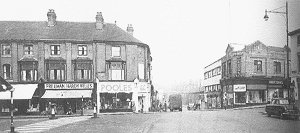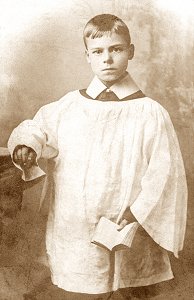My grandparents and parents in Birmingham
|
After my grandparents left Wolverhampton they lived in
several different parts of Staffordshire. My father was born at
Hednesford at a time when the only work my grandfather could find was
working in the mine at Valley Colliery. This employment was taken, I
think, in desperation. In about 1910 he came to Birmingham and obtained
employment managing the shop of W.H.Heaton & Co in Great Hampton Street,
Hockley, Birmingham. They were saddlers and it will be recalled that
this was my grandfather's trade. The family lived over the company's
shop in Farm Street, just off Hockley Brook.
The family now seem to have been very settled, with their father in
good, regular employment. Then that awful day in 1912 came when Henry
died quite suddenly, leaving my grandmother and the boys more or less
penniless. As we discovered previously, Lilly was determined to keep the
family all together. During this difficult time she went to work in
service for the Poole family who lived in Hampstead Road, Handsworth. In
those days Hampstead Road was a very upmarket area.
|
|

Poole's shop in Hockley in later times.
|
The Poole's had department stores in Villa Cross and Hockley Brook. I
think they must have been very good to my grandmother.
As mentioned
previously, no help was forthcoming from the family in Wolverhampton. I
feel sure that had my great grandfather lived a little longer some help
would have been forthcoming. This was confirmed by the contents of his
will. |
| My grandmother had a Sister Jessie, who I know came to see her at that
time. Jessie and her husband, Jack, lived at Newark. They Managed the
grocers shop in the town square. Jack gave my father a Victorian five
shilling piece and said "Keep this and you will never go broke". Many
years later, when I was in my teens, we visited Jack and Jessie. At this
meeting the old man gave me a Georgian five shilling piece in the same
way as my father was given his coin. When our boys, Steven and Adrian,
reached the ages of 21 they were each given one of the coins. |
| My father, Harry, was educated at Farm Street School
in Birmingham.
He also attended St Saviour's church in Farm Street. He was a
member of the choir and ultimately became Head Boy. The photo
(left) is of him as a choir boy.
In those days he had a girl friend named Lillian Marion
Olerenshaw. Lillian is still alive and now living on Walsall
Road at Great Barr. Sylvia and I went to see her. She remembered
my father well. In those days she would meet him at the Youth
Club in Hockley Hall opposite St Saviour's Church in Farm
Street. When Lilly's boys started work they all went into a
trade with the exception of George William. He was a problem
child and I cannot establish details about him. Benjamin
became a cycle builder, as did Jack, and my father served an
apprenticeship as a press toolmaker. |

My father Harry. |
| We
could not find the registration of Jack's birth. It would appear that he
started work at the age of about 12 years in order to help with the
family finances. Not having a birth certificate must have helped this
situation to be achieved. Benjamin, the eldest son, served in the
trenches in France during the 1914-8 War. He was wounded and had a
silver plate fitted in his one hand. When my father, Harry, left school he obtained a job with a small
engineering company as an apprentice toolmaker. His boss was a Mr
R.T.Webb, who was the owner of the company. It is interesting to note
that when I started work in 1951 the same Bob Webb was working in the
Tool Design Office as a Planner at Nuffield Metal Products, the company
at which I served my apprenticeship as an Engineering Technician.
When my father had finished his apprenticeship he worked for several
companies to enable him to obtain more experience in the tool making
trade. Part of this time was spent working in the jewellery trade. This
was very intricate, small work. In those days the mounting for diamond
rings etc. were pressed; nowadays they are all cast. He also spent an
amount of time in bakelite moulding, which is now known as plastic
moulding. This work required a very high standard of finish on the tools
and he found this rather boring due to the many hours that had to be
spent polishing the work. After obtaining this experience he then worked
in the tool room at Joseph Lucas Ltd, Great King Street, Birmingham. He
was employed by Lucas's for a number of years. My father was a very
capable toolmaker but found that when chances of promotion came along he
was passed over and less capable people received advancement. It was
generally thought in the Lucas tool room that if you were good on the
bench that is where you remained, due to the difficulties in replacing
people with such a high standard of skill.
It is interesting to note that many small engineering companies that
were started in the middle to late 1930s and that many the founders of
these companies originated from the Joseph Lucas tool room in Great King
Street. Examples of these are:
Lenches Toolmakers Ltd, in Barr Street (the Lench brothers).
Press Tools Ltd in Berner Street (Mr Srayson).
Seal & Butler Ltd in Augusta Street (Dick Seal & Harry Butler).
Wilton & Co (Stampings) Ltd (Bernard Shewell, John Shewell, and Harry
Rollings, my father). |
The only one of these companies that is still in business with its
original registration number is Wilton & Co. (Stampings) Ltd. though
through the passage of time it has had two changes of name. In the late
1950s the name was changed to Wilton & Co (Pressings) Ltd, the reason
being that our principal activity was making pressings, not stampings.
In 1989, due to part of the organisation being sold to A.J. Williams
(Tamworth) Ltd, the name was changed to Rollings Holdings Ltd. That
remains its name up to the present day and it is still the original
company and in the hands of the Rollings family. It is now run by our
eldest son, Steven.
Before proceeding further with the business side of things, I will
return to the family.
|
 |
|
 |
|
 |
Return to the
previous page |
|
Return to the
contents |
|
Proceed to the
next page |
|